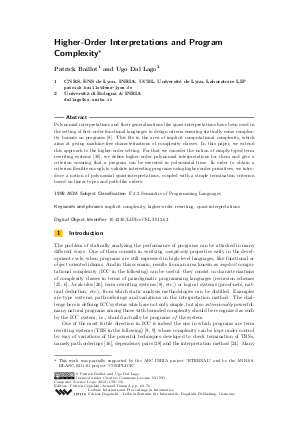Higher-Order Interpretations and Program Complexity
Authors Patrick Baillot, Ugo Dal Lago
-
Part of:
Volume:
Computer Science Logic (CSL'12) - 26th International Workshop/21st Annual Conference of the EACSL (CSL 2012)
Part of: Series: Leibniz International Proceedings in Informatics (LIPIcs)
Part of: Conference: Computer Science Logic (CSL) - License:
 Creative Commons Attribution-NonCommercial-NoDerivs 3.0 Unported license
Creative Commons Attribution-NonCommercial-NoDerivs 3.0 Unported license
- Publication Date: 2012-09-03
File

PDF
LIPIcs.CSL.2012.62.pdf
- Filesize: 0.54 MB
- 15 pages
Document Identifiers
Subject Classification
Keywords
- implicit complexity
- higher-order rewriting
- quasi-interpretations
Metrics
- Access Statistics
-
Total Accesses (updated on a weekly basis)
0PDF Downloads0Metadata Views
Abstract
Polynomial interpretations and their generalizations like quasi-interpretations have been used in the setting of first-order functional languages to design criteria ensuring statically some complexity bounds on programs. This fits in the area of implicit computational complexity, which aims at giving machine-free characterizations of complexity classes. In this paper, we extend this approach to the higher-order setting. For that we consider the notion of simply-typed term rewriting systems, we define higher-order polynomial interpretations for them and give a criterion ensuring that a program can be executed in polynomial time. In order to obtain a criterion flexible enough to validate interesting programs using higher-order primitives, we introduce a notion of polynomial quasi-interpretations, coupled with a simple termination criterion based on linear types and path-like orders.
Cite As Get BibTex
Patrick Baillot and Ugo Dal Lago. Higher-Order Interpretations and Program Complexity. In Computer Science Logic (CSL'12) - 26th International Workshop/21st Annual Conference of the EACSL. Leibniz International Proceedings in Informatics (LIPIcs), Volume 16, pp. 62-76, Schloss Dagstuhl – Leibniz-Zentrum für Informatik (2012)
https://doi.org/10.4230/LIPIcs.CSL.2012.62
BibTex
@InProceedings{baillot_et_al:LIPIcs.CSL.2012.62,
author = {Baillot, Patrick and Dal Lago, Ugo},
title = {{Higher-Order Interpretations and Program Complexity}},
booktitle = {Computer Science Logic (CSL'12) - 26th International Workshop/21st Annual Conference of the EACSL},
pages = {62--76},
series = {Leibniz International Proceedings in Informatics (LIPIcs)},
ISBN = {978-3-939897-42-2},
ISSN = {1868-8969},
year = {2012},
volume = {16},
editor = {C\'{e}gielski, Patrick and Durand, Arnaud},
publisher = {Schloss Dagstuhl -- Leibniz-Zentrum f{\"u}r Informatik},
address = {Dagstuhl, Germany},
URL = {https://drops.dagstuhl.de/entities/document/10.4230/LIPIcs.CSL.2012.62},
URN = {urn:nbn:de:0030-drops-36641},
doi = {10.4230/LIPIcs.CSL.2012.62},
annote = {Keywords: implicit complexity, higher-order rewriting, quasi-interpretations}
}
